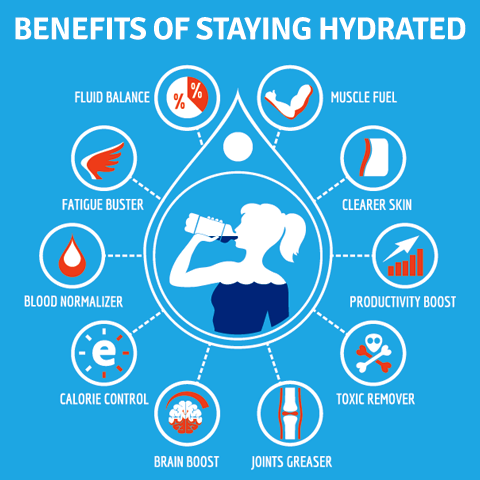Water is one of our body’s six essential nutrients, making up 50 to 75 percent of the human body. Water forms the basis of blood, digestive juices, urine, and perspiration, and water is contained in lean muscle, fat, and bones. However, we do not have the capacity to store water in significant volumes, therefore, we need to intake fluids daily to hydrate every cell in our body. The amount we need depends on our body size, metabolism, weather conditions, the food we eat, and our activity levels.
When evaluating your fluid requirements, there are two things to consider: the fluid required for your general body needs PLUS the additional fluid needed for your training.

Hydration Recommendations for Athletes
Here are some guidelines you can follow to ensure you’re staying properly hydrated while practicing or playing roller derby, or any kind of physical activity.
Before Exercise:
- All athletes should start their exercise well hydrated.
- Athletes should drink 16-24 fl.oz. of water within the 2 hours prior to training.
- At 10- 20 minutes prior to exercise, consume another 7-10 fl.oz. of water.
During Exercise:
- All athletes should consume approximately 6-12 fl.oz. every 10-20 minutes throughout their training.
- Drink beyond your thirst!
After Exercise:
It is recommended for athletes to record their weight before and after training. This is especially true in hot and humid conditions, in extreme cold weather training, for individuals with a high sweat rate, and at high altitudes. These variables can increase one’s rate of water loss during training.
- Athletes should replace every 1 pound of loss in weight with 16-24 fl.oz. of water.
- The total fluid consumed should be focused within 2 hours post-training, however fully consumed within 6 hours.
Goals of Performance Hydration
- Begin workouts in a well-hydrated state.
- Maintain hydration throughout practice/competition.
- Maximize performance.
- Improve ability to recover quickly from training and competition.
- Minimize injury and muscle cramps.
Consequences of Dehydration
- Performance declines with as little as 2 to 3 percent decrease in body weight from water (sweat) loss.
- Increased core temperature and heart rate.
- Decreased blood pressure.
- Nausea and vomiting.
- General feeling of fatigue, Headaches, cramps.
What About Sports Drinks?
Sports drinks are designed to rehydrate, provide energy, and replenish the body’s electrolytes, especially sodium, which is lost through sweating. Sports drinks also contain carbohydrates–the body’s main source of energy. During prolonged, intense exercise, it is important to replace the fluid and minerals lost in sweat. The appropriate amount for rehydration will depend on factors such as the level and duration of exertion. Reduce the risk of fluid-electrolyte imbalances such as hyponatremia (dangerously low blood sodium level), which can occur after long and intense exercise when a high level of sweating has also occurred and large volumes of plain water are consumed.
Athletes that will benefit most from a sports drink are those intensely exercising for longer than 60 minutes and salty sweaters. Sports drinks are designed to help replenish sodium lost from sweat. If exercising longer than 60 minutes, consuming a few gulps of a sports drink every 15 to 20 minutes can help to maintain energy and electrolyte levels, and sustain performance.
Other Notes
- Fruits and vegetables are made mostly of water and are a great way to add fluids to help meet your hydration needs. Plus, they have lots of vitamins and minerals!
- If you are a salty sweater, eat salty foods before activity and don’t be afraid to use the salt shaker. Replace losses post-workout with watery foods that contain salt, such as broth-based soups or vegetable juice.
- Other sources of water include smoothies, juice, sports drinks, and tea. However, be wary of the extra calories these liquids may contain.
- Carry a water bottle with you so you can drink water throughout the day.